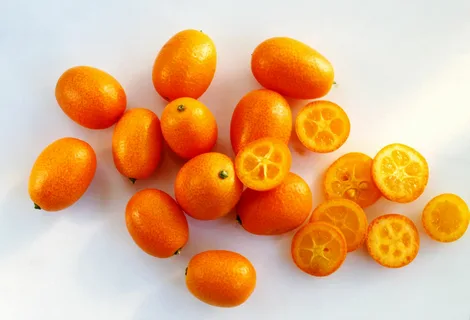Introduction to Kumquats
Kumquats (Fortunella) are small, oval citrus fruits that originate from South Asia and the Asia-Pacific region. They are now grown in other parts of the world, including the United States. The unique feature of kumquats is that their rind is sweet and the flesh is sour, offering a burst of flavor when eaten whole.
Nutritional Profile of Kumquats
Kumquats are low in calories but rich in nutrients. Here’s what a typical serving (about 100 grams) of kumquats contains:
- Calories Approximately 71
- Fiber 6.5 grams
- Vitamins High in vitamin C, with significant amounts of vitamins A and B-complex.
- Minerals Contains calcium, potassium, and magnesium.
- Antioxidants Rich in flavonoids and essential oils like limonene and pinene.
Health Benefits of Kumquats
Kumquats offer several health benefits due to their rich nutrient composition:
Boosting Immune System
High vitamin C content helps boost the immune system and combat infections.
Antioxidant Properties
Antioxidants in kumquats help fight free radicals, reducing oxidative stress and potentially lowering the risk of chronic diseases.
Digestive Health
The dietary fiber in kumquats aids in digestion and helps maintain a healthy gut.
Heart Health
The fiber, potassium, and vitamin content in kumquats help support heart health by lowering cholesterol levels and regulating blood pressure.
Weight Management
Low in calories and high in fiber, kumquats can help in feeling fuller longer, aiding in weight management efforts.
Skin Health
Vitamin A and C are vital for skin health, helping to rejuvenate skin and boost collagen production.
Culinary Uses of Kumquats
Kumquats are versatile in the kitchen. They can be used in various culinary preparations:
Eaten Raw
The simplest way to enjoy kumquats is to eat them whole, either as a snack or sliced into salads.
Preserves and Jams
Kumquats make excellent preserves, jams, and marmalades due to their unique flavor profile.
Baked Goods
Incorporate kumquats into cakes, tarts, and pastries for a citrusy zest.
Sauces and Marinades
Add kumquats to sauces and marinades for a burst of citrus flavor.
Beverages
Kumquats can be juiced or added to cocktails and smoothies for a refreshing twist.
How to Select and Store Kumquats
Selecting and storing kumquats properly ensures they remain fresh and flavorful:
Selection
Look for firm kumquats with a bright orange color. Avoid any with blemishes or signs of softening.
Storage
Kumquats can be stored at room temperature for a few days or in the refrigerator for up to two weeks. They can also be frozen for longer storage.
Simple Recipes Featuring Kumquats
Here are a few simple recipes to get started with kumquats:
Kumquat Salad
Slice kumquats and mix with mixed greens, nuts, and a vinaigrette dressing.
Kumquat Marmalade
Simmer whole kumquats with sugar and water until the mixture thickens.
Kumquat Cake
Add chopped kumquats into your favorite cake batter for a citrusy twist.
Kumquat Smoothie: Blend kumquats with yogurt and honey for a refreshing drink.
Frequently Asked Questions
Can you eat the skin of a kumquat?
Yes, the skin of the kumquat is edible and is actually the sweetest part of the fruit.
Are kumquats high in sugar?
Kumquats are low in sugar compared to many fruits, making them a healthier choice for a natural sweet treat.
How do you eat kumquats?
Kumquats can be eaten whole, cooked, or used as a garnish. The entire fruit is edible, including the seeds, though some prefer to remove them.
What are the best ways to preserve kumquats?
Kumquats can be preserved through canning, making marmalade, or drying.
Can kumquats be used as a substitute for other citrus fruits?
Yes, kumquats can substitute other citrus fruits in most recipes, providing a similar yet distinctively sweet and tangy flavor.
Are kumquats good for diabetics?
Yes, kumquats are low in sugar and high in fiber, making them suitable for people managing diabetes.
Can you grow kumquats at home?
Yes, kumquats can be grown in pots or in the garden if you live in a suitable climate, typically USDA zones 9 through 11.
Conclusion
Kumquats are not only a delightful and tangy fruit but also offer numerous health benefits. Whether eaten raw, cooked, or used as a flavor enhancer, kumquats can add nutritional value and zest to your diet. By incorporating kumquats into your culinary repertoire, you can enjoy the unique taste and health benefits of this small but mighty citrus fruit.
- Top 12 Foods That Are High in Phosphorus - April 23, 2024
- Almond Butter vs. Peanut Butter: What Healthiest? - April 23, 2024
- The 14 Best Gluten-Free Flours - April 23, 2024


